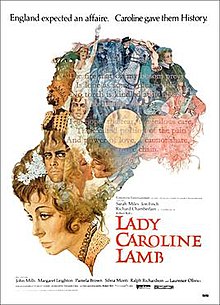Lady Caroline Lamb (film): Difference between revisions
m Bot: Migrating 3 interwiki links, now provided by Wikidata on d:q1110102 |
No edit summary |
||
| Line 1: | Line 1: | ||
{{Infobox Film | |
{{Infobox Film | |
||
name = Lady Caroline Lamb| |
name = Lady Caroline Lamb| |
||
image = |
image = ladycarolinelamb.jpg| |
||
caption = Film poster art by Ted CoConis |
|||
director = [[Robert Bolt]] | |
director = [[Robert Bolt]] | |
||
writer = [[Robert Bolt]]| |
writer = [[Robert Bolt]]| |
||
Revision as of 12:58, 6 April 2013
| Lady Caroline Lamb | |
|---|---|
 Film poster art by Ted CoConis
director = Robert Bolt | |
| Written by | Robert Bolt |
| Produced by | Fernando Ghia |
| Starring | Sarah Miles Jon Finch Richard Chamberlain Laurence Olivier |
| Distributed by | MGM |
Release date | 1973 |
| Language | English |
Lady Caroline Lamb is a 1972 film based on the life of the notorious Lady Caroline Lamb, lover of Lord Byron and wife of Prime Minister Viscount Melbourne. The film was written and directed by Robert Bolt and starred his wife, Sarah Miles, as Lady Caroline.
Other stars included Jon Finch as the long-suffering Mr Lamb (a role first offered to Timothy Dalton), Laurence Olivier as the Duke of Wellington, Richard Chamberlain as Byron, and Ralph Richardson as King George IV. The film is also notable because it is the last film in which Michael Wilding appeared, in an uncredited, non-speaking cameo with his last wife, Margaret Leighton, who played Lady Melbourne.
The film received mixed critical reviews, and was a box-office failure; the film was criticized both for its historical inaccuracies (the timing of William Lamb's political career, the portrayal of Byron as a tall, handsome man who lacked his characteristic limp) and for its own (lack of) merits.
Positive reviews praised Miles' performance and Bolt's direction, which was clearly inspired by his frequent collaborator David Lean. Praise also came for Laurence Olivier's cameo as the Duke of Wellington, with Philip French of The Times writing that "... Olivier's brief appearance as the Duke of Wellington is a beautifully witty and rounded characterisation that is worth the price of the admission in itself".[1]
The film's failure dissuaded Bolt from further directorial work, and may have contributed to his breakup with Sarah Miles.
The film had an atmospheric music score composed by Richard Rodney Bennett, who later based a concert work, Elegy for Lady Caroline Lamb for viola and orchestra, on some of the material.
External links
References
- ^ The Films of Laurence Olivier, by Margaret Morley, Citadel, 1977, p 176
